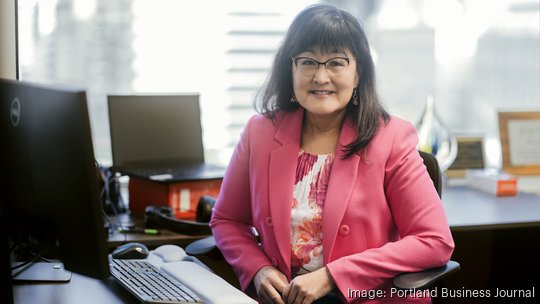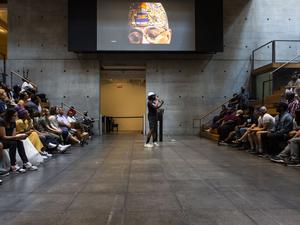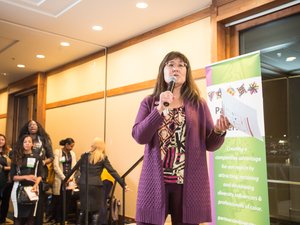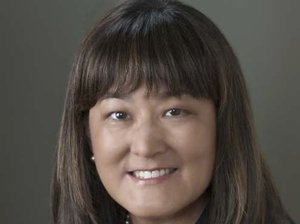
Long before Mari Watanabe was executive director of Partners in Diversity she was a beneficiary of the organization.
Born and raised in Seattle, she worked around the country for apparel makers. In 2000 she landed in Portland thanks to a job at Nike. That’s when she set about looking for her community.
“When I started at Nike I was actually looking for the Asian community, and I couldn't find it. So I kept asking people,” she recalls. Eventually she found her way to the group Portland Taiko, which, according to its website, inspires Asian American pride and community through performances and workshops on Japanese taiko drumming.
Soon after she was introduced to Say Hey!, a quarterly networking event designed to help professionals of color connect and hopefully stay in the region. Given the overall lack of diversity in Portland, it can be difficult for people of color who move to the city to find community. It's an issue that can affect employers, who can find it challenging to recruit and then retain employees of color. Groups like Partners in Diversity have been working to address that.
Watanabe was at Nike for seven years before she traded in her decades in the apparel industry for work in the nonprofit world. She has been leading Partners in Diversity, a nonprofit affiliate of the Portland Metro Chamber, since 2012. The group runs the Say Hey! program as well as providing training and support for companies working on their internal diversity, equity and inclusion.
After 11 years at the helm, Watanabe is retiring, but not before organizing one last event. On Sept. 26, Partners in Diversity is hosting the Northwest Equity Summit at the Oregon Convention Center.
The summit is the latest iteration of the PGE Diversity Summit, an event for the utility’s employees. As it grew, Partners in Diversity was asked to take on the event, which is aimed at middle managers who want to incorporate DEI into their work.
The first event, slated for 2020, was delayed by the pandemic. A virtual event in 2021 attracted 1,200 attendees, Watanabe said. This year, the in-person event has keynotes from authors Lily Zheng and Michelle MiJung Kim.
On the eve of the 2023 event, and Watanabe's retirement, we caught up with her to talk about her journey to Partners in Diversity, her proudest moments and what's next. This interview has been edited for length and clarity.
Before joining, what was your connection to Partners in Diversity? Partners in Diversity has been doing Say Hey! since 1999. Vicki Nakashima, who is the founder of Partners in Diversity and Say Hey!, she was (working on a project with) Nike. She had access to all of our emails and sent out an invitation to Say Hey! I didn’t know what it was but I was trying to meet people because I was new to Oregon. I loved Say Hey! and so I kept going. Fast forward, and when (the Portland Metro Chamber) decided to make this (PID director) an actual half-time paid position, they sent out an email and I was like, I love Say Hey! I didn’t know anything about the chamber, I didn’t know they existed. The job was half-time and the other half was running Leadership Portland.
When I first moved to Portland a friend introduced me to Say Hey! And it was eye-opening to see so many people that I wasn’t seeing everyday. How has that event changed over the years? When I started it was fairly popular. We averaged 200 to 250 people. And now we max out our venues and we require 500-person capacity. If we are outside and we have a big enough venue, we will go to 700. We did one at OMSI and there were 700, we did one with OHSU outside and it was probably 600. So, it’s the walls that confine us.
Looking back on your time leading Partners in Diversity, what are you most proud of? That we have grown. We have a staff of six people now and this position is full-time. We do things for our employer side, we do things for the community side but everything we do is geared toward getting people of color to come here, stay here and help our community grow. We have been able to build our programs so that we are seen as a resource for these employers. We are able to be a resource for a lot of employers who can’t afford to have a DEI person or can’t afford to go to (far off) training. We’ve also done research on our own community. And just having a Say Hey! where we can have 600 people, 700 people that’s a place for communities of color professionals to meet, that makes me feel real good. When I’m at Say Hey! I feel like I can breath. Being able to have a space where we can be majority and then to meet each other and to build our own networks.
There is a sense of legacy with Say Hey!. Over the years we have done interviews with honorees, the new people we introduce at the events, and they all started to say the same thing. Whether they have been here for 15 years or 10 years or five years, they all say the people that their friends now are the people they met at Say Hey! That is what makes me say, ok, I am making a difference. Partners in Diversity is making a difference.
You’ve been doing DEI work for a decade. Has anything changed; Have we moved the needle? I would say yes, the needle has moved. When I first started people would go, “D, E, what?” I think people are more aware of diversity, equity, inclusion and any other acronyms. I think that is the greatest shift I have seen. People being aware. Have there been shifts within organizations? It depends. I think you will see in some organizations if the leaders are really bought in, I’ve seen change. I’ve seen some changes and some CEOs (that I doubted). They definitely had good intentions but, (I wondered) are they going to be able to actually do it, move in the right direction. And yes, they have. There are others who have struggled. It’s challenging work and right now there are a lot of burnt out DEI professionals.
Do you see Partners in Diversity also acting as a place for DEI practitioners to come together as well? We’ve talked about that. We haven’t (yet). We’ve been working on starting our own community resource groups. They are like affinity groups. Over the last year we started the Black, the Asian Pacific Islander, the Native American and the Latino CRGs, community resource groups. We have programming for each affinity group once a quarter. Those are for anybody. What we’ve talked about is having an affinity group for DEI professionals that work in organizations. It’s lonely work. You’re often the only or maybe you have a small team, so having that support group (is important).
What has kept you energized about this work? We have a changing workforce. Our demographics are changing. We’ve always talked about helping prepare our employers for when they do have a lot more racial diversity within their organizations. So, helping prepare them to be an inclusive organization that people want to work for, that’s important. And again, my (personal) value of making a difference. It doesn’t have to be big, it can be small. So when I see those wins we make, like some CEO comes to me and says they love our programming that it’s really helped them. Or seeing 700 people show up to Say Hey!, seeing sponsors lining up to want to sponsor one of our events. Those are all big wins and that energizes me.







